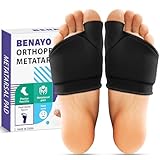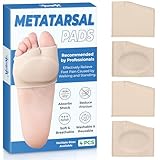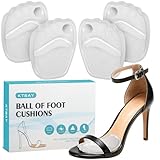Does the ball of your foot sting after a short run? You are not alone. Many runners feel that sharp, burning pain right behind their toes. This common issue, often called metatarsalgia, can stop you from enjoying your favorite activity. Finding the right running shoe feels like a huge puzzle. You see endless models, and every brand claims to have the best cushioning.
Choosing the wrong shoe can actually make the pain worse. You need support that targets that specific sensitive area, but how do you find it amidst all the jargon and features? This guide cuts through the confusion. We will show you exactly what features matter most when your forefoot hurts.
By the end of this post, you will know precisely which shoe characteristics offer relief. We break down cushioning, stability, and fit to help you step back onto the road pain-free. Let’s explore the best running shoes designed to protect the ball of your foot so you can run comfortably again.
Top Running Shoes For Ball Of Foot Pain Recommendations
- Immediate, all-day pain relief
- Supportive cushioning protects the ball of foot from ground impact
- Placed just behind the ball of foot, the raised cushioning lifts your tarsal bones to transfer pressure off of the ball of foot
- Helps protect against calluses, Metatarsalgia, & Morton's Neuroma
- Scientifically designed & engineered. Fits in virtually any shoe with no trimming required. Adhesive backing helps the insert stay in place.
- This 4-pack of gel metatarsal pads fits women’s shoe sizes 8-12.5 and men's shoe sizes 7-11 to offer more comfort, support and reliability across the entire forefoot. Unlike a shoe insole, our meta pads are designed to be worn over your foot for better fit and protection to the bottom of your feet.
- Alleviate pain due to calluses, corns, sesamoiditis or Morton neuromas caused by long periods of standing, running, dancing, or other high impact activities. The cushioning gel comforts, soothes and balances your forefeet for all day relief, whether wearing high heels, running shoes or loafers.
- Relieves pressure on the ball of your foot by providing weight distribution and shock absorption while walking, running and standing. Protects the fragile sesamoid and metatarsals from further damage.
- ZenToes Metatarsal Ball of Foot cushions save you money because they are washable and reusable. Simply hand wash with gentle soap and warm water and lay flat to dry. With 2 pairs in each package, you’ll always have a set ready to wear!
- Fits Most, But Not All: Every foot is unique, so while our product works for the majority of customers, it may not be a perfect fit for everyone. If it doesn’t work for you, we’re happy to offer a refund or replacement in a different size or style.
- High Arch Support: Cushioned gel pads provide high arch support for flat feet and bunion relief.
- Ball of Foot Cushions: Gel balls cushion the ball of foot for comfort and pain relief.
- Forefoot Support: Cushioned gel pads relieve neuroma and callus pain in the forefoot.
- Unisex Design: Cushioned insoles are suitable for men and women.
- Easy to Clean: Gel pads can be easily cleaned for hygiene.
- JUST BE YOURSELF-The premium exclusive medical Gel material this Orthopedic Metatarsal Pads conforms to the natural curve of your foot and supports your feet to ensure comfort.The perfect balance of luxurious comfort and optimal support to help you be yourself,move freedomly.
- COMFORTABLE ALL DAY WEAR- We all don't want in Constant pain when walking, a feeling of discomfort and rapid appearance of fatigue in the feet, significantly reduce the mobility of a person.With this solution you can take part in all weight-bearing activities that you've always enjoyed – yoga,running, dancing, walking, hiking,we can finally enjoy our day free from pain.
- Superior Comfort and Cushioning: Ball of Foot Cushion with Gel Pad offer exceptional pain relief from a range of Metatarsalgia related issues.Designed to provide effective relief for Metatarsalgia,a common foot condition characterized by the forefoot joint.It gently provide the cushioning,reducing pain,discomfort, and inflammation associated with metatarsalgia,allowing you to enjoy improved foot comfort and mobility.
- High-Quality Medical Material: This Metatarsal Pads help you enormously when working or standing all day,absorbs pressure on your toe.Relieves pressure on the ball of your foot by providing weight distribution and shock absorption while walking,running and standing.Protects the fragile sesamoid and metatarsals from further damage.
- BENAYO Metatarsal Pads provide 4 size Option to fit all your need.This forefoot helper is the perfect gift for the lovers and family & friend in your life.We follow a fine quality-making process that gives us confidence in our product.No Questions Asked.We stand behind our product and we know that it will help you.
- 【PROFESSIONAL RELIEF】Engineered to directly cushion the ball of your foot, these pads may help alleviate discomfort associated with metatarsalgia, Morton’s neuroma, sesamoiditis, and general forefoot pain. Get back to enjoying walking, running, or long hours on your feet.
- 【DISCREET & UNIVERSAL FIT】The low-profile sleeve slips invisibly into all your footwear—sneakers, dress shoes, heels, or boots. Wear it with or without socks for instant, discreet support that doesn’t alter your shoe’s fit.
- 【SECURE, ALL-DAY COMFORT】Made with moisture-wicking, breathable knit to keep feet cool and dry. Available in three sizes (S, M, L) and two colors (Beige/Black) for a personalized, secure fit that stays comfortably in place all day.
- 【DURABLE & REUSABLE VALUE】This 2-Pair Set offers exceptional value. The durable gel and fabric retain their supportive shape wash after wash. Simply hand wash with mild soap and air dry for hygienic, reusable relief that lasts.
- 【PROMOTES HEALTHY WEIGHT DISTRIBUTION】Helps redistribute pressure away from sensitive metatarsal bones and sesamoids, providing shock absorption during standing, exercise, or wearing high heels. A proactive step to protect against calluses and discomfort.
- [Pain Relief]: When you stand for long periods of time, run, dance, or do other high-impact activities, this can cause blisters, calluses, and corns. Our metatarsal pads men can effectively improve Morton's neuroma, sesamoiditis, metatarsalgia, bunions and relieve foot pain
- [Upgraded Gel Metatarsal Pads]: Metatarsal pads women are designed with a honeycomb structure. It is able to rebound and dampen shock, distribute forefoot pressure, prevent blisters and calluses from forming, and relieve squeezing pain. This metatarsal pad is designed by a professional podiatrist
- [Soft & Comfortable]: Metatarsal foot pad is made of breathable fabric and thickened gel pad. Provides enhanced cushioning. It reduces friction and over-compression between the foot and the shoe, making you feel comfortable when standing and walking for long periods of time
- [All Day Support]: Metatarsal pads provide continuous support day and night. It supports you during everyday activities such as walking and running. Whether you wear high heels, running shoes or casual shoes, our gel metatarsalgia pads provide comfort and balance in the forefoot for all day long
- [What You Will Get]: 4Pcs (large size) metatarsal foot pads for women & men. If you have any questions, please contact us. Try it, you will love it
- 【Unique Design】This KTSAY ball of foot cushions has a recessed at the big toe area to allow your toes to spread out comfortably. The toe area design has a raised ridge to prevent your foot from sliding forward. It fits your forefoot perfectly, makes you more comfortable when wearing high heels.
- 【High-quality Materials】The forefoot pads is made of medical-grade gel, lightweight and ultra-thin, providing ample space for your feet, cushioning and relieve foot pain. The surface is made of suede, which is soft to the feet, breathable and sweat-absorbent. The back has excellent adhesion, which can fix the insole on high heels and sneakers, and the insole will not move when you are active.
- 【How To Use】One size fits all heel insoles for women. To use, all you need to do is peel off the tape on the back of the footbed, stick it to the spot where you place the insole, and press to secure it. And KTSAY foot pads is portable, ready to use when needed.washable and reusable.
- 【Perfect Match】When you need to stand, walk, or dance in high heels for a long time at work, weddings, dances, etc., which makes your feet painful, the ball of foot cushions is a good choice. It has good cushioning ability and raised massage dots on the surface to relieve foot discomfort, helping you take every step comfortably, and have a good day.
- 【Tips】You will get metatarsal pads women. Of course, you can not only match it with high heels, but also use it on other shoes, such as:boots, shoes, sandals. If you are not satisfied, please contact us, KTSAY will provide you with quality after-sales service.
- 【Targeted Relief for Foot Pain】These metatarsal pads insoles provide ball of foot pain relief, reduce pressure from Morton’s neuroma, and support plantar fasciitis recovery. The built-in metatarsal cushion absorbs shock for all-day comfort.
- 【Designed for Sports & Daily Use】 These athletic running insoles feature a highly elastic forefoot gel cushion that effectively absorbs impact during walking and running. The added metatarsal pad reduces pressure on the ball of the foot to relieve forefoot pain, while the non-slip gel base keeps the insoles securely in place.
- 【Innovative Arch Support Design】Features multi-density foam modules that dynamically adapt to your foot's arch contour. Provides customized reinforcement for both flat feet and high arches, promoting proper gait alignment and helping prevent plantar fasciitis.
- 【Comfort for All-Day Wear】Made from premium cushioning foam, these orthotic metatarsalgia insoles fit most shoes (Running/Walking/Hiking/Trail Shoes) and are perfect for running, walking, hiking or standing jobs.
- 【Breathable & Odor-free】The advanced moisture-wicking fabric layer actively keeps feet dry, while innovative ventilation technology helps maintain freshness—perfect for active wearers.
Finding Your Perfect Fit: A Buying Guide for Running Shoes for Ball of Foot Pain
Running feels great, but when the ball of your foot hurts, it can stop you in your tracks. This pain, often called metatarsalgia, needs the right running shoe for relief. Choosing the right pair makes all the difference. This guide helps you find shoes that cushion and support your feet so you can keep moving.
Key Features to Look For
When shopping, focus on features that directly address pressure under your toes. A good shoe acts like a shock absorber for that sensitive area.
- Excellent Forefoot Cushioning: This is the most important feature. Look for thick, soft foam directly under the ball of your foot. This padding absorbs impact when you push off.
- Wide Toe Box: Your toes need room to spread out naturally. A narrow toe box squeezes the forefoot, increasing pressure. A wide toe box relieves this squeezing.
- Rocker Bottom Design: Some shoes have a slightly curved sole shape. This design helps your foot roll forward smoothly during your stride, reducing the need for the ball of your foot to bend sharply.
- Midfoot Support (Arch Support): Strong arch support helps distribute your body weight more evenly across your entire foot, taking stress off the forefoot.
Important Materials That Matter
The materials used determine how well the shoe cushions and lasts.
Cushioning Foams
The midsole foam is crucial. Modern running shoes use various foams. EVA (Ethylene-Vinyl Acetate) is common, but newer, more responsive foams like TPU (Thermoplastic Polyurethane) offer better energy return and long-lasting softness. Softer foams generally provide more immediate pain relief.
Outsole Rubber
The bottom layer, the outsole, needs durable rubber. Look for high-abrasion rubber in key wear areas. Good rubber prevents the shoe from breaking down too quickly, which would expose you to more impact.
Upper Material
The upper part wraps your foot. A seamless, engineered mesh upper is usually best. It breathes well and reduces rubbing or hot spots that can irritate sensitive areas.
Factors That Improve or Reduce Shoe Quality
Not all shoes are built the same. Quality comes down to construction and design intent.
What Improves Quality:
- High Stack Height: This means the shoe has a lot of material between your foot and the ground, offering maximum cushioning.
- Good Heel-to-Toe Drop: A slightly higher drop (the difference in height between the heel and the forefoot) can sometimes shift pressure away from the ball of the foot slightly.
- Removable Insoles: If the built-in insole is not perfect, you can easily remove it and insert custom orthotics or over-the-counter inserts designed for metatarsalgia.
What Reduces Quality (or Suitability):
- Minimalist or “Barefoot” Shoes: These offer little to no cushioning and should generally be avoided if you have forefoot pain.
- Excessive Flexibility in the Forefoot: While some flexibility is good, a shoe that bends too easily right under the ball of the foot won’t protect you from impact. A slight stiffness here can be beneficial.
- Heavy, Stiff Shoes: These shoes force your foot to work harder and absorb more shock awkwardly.
User Experience and Use Cases
Think about how you plan to use the shoes. A shoe perfect for long-distance marathon training might not be the best choice for quick 5K runs or walking.
For maximum cushioning and daily walking, look for highly cushioned “Maximalist” shoes. These provide a cloud-like feel, minimizing every step’s impact. If you need a shoe for faster workouts, seek out a well-cushioned trainer that still feels light enough for quicker turnover.
Always try shoes on later in the day when your feet are slightly swollen. Walk around the store. If you feel any immediate pinching or sharp pressure on the ball of your foot, put the shoe back. The right shoe should feel comfortable immediately; no break-in period should be required for pain relief.
10 Frequently Asked Questions (FAQ) About Running Shoes for Ball of Foot Pain
Q: What is the main cause of pain in the ball of my foot when running?
A: The pain is often caused by too much pressure on the metatarsal bones, which are the long bones leading to your toes. This can happen from overuse, high impact, or shoes that lack enough cushioning.
Q: Do I need a special size or width?
A: Yes. People with forefoot pain often need a wider size in the forefoot area. Make sure your toes can wiggle freely without being squished from the sides.
Q: Are minimalist shoes okay for ball of foot pain?
A: Generally, no. Minimalist shoes have very little padding. Your forefoot needs protection and cushioning to reduce impact when you run.
Q: How much cushioning is enough?
A: You should look for shoes described as “highly cushioned” or “max cushion.” These shoes use thick layers of soft foam to absorb the shock that usually hurts your forefoot.
Q: Should I look for a specific heel-to-toe drop?
A: A moderate to high drop (8mm to 12mm) can sometimes help because it shifts some of the pressure slightly backward toward the heel, away from the painful ball of the foot.
Q: Can a shoe rocker help my pain?
A: Yes. A rocker sole helps your foot roll forward easily. This reduces how much the painful joint has to bend with every step, making your stride smoother.
Q: How important is the arch support for this type of pain?
A: Arch support is very important. Strong support helps spread your weight out. If your arch collapses, more weight ends up focused right on the ball of your foot.
Q: When should I replace my running shoes?
A: You should replace them every 300 to 500 miles. Once the foam breaks down and loses its bounce, the protection for your forefoot disappears, and the pain will likely return.
Q: Are stability or neutral shoes better for forefoot pain?
A: Usually, neutral shoes with good cushioning are preferred, unless your foot rolls inward excessively (overpronation). If you need stability, make sure the stability features don’t feel too hard directly under the painful spot.
Q: Can I use orthotics with these shoes?
A: Absolutely. Most modern running shoes have removable insoles, which allows you to use custom or store-bought orthotics that target metatarsal support specifically for better relief.








